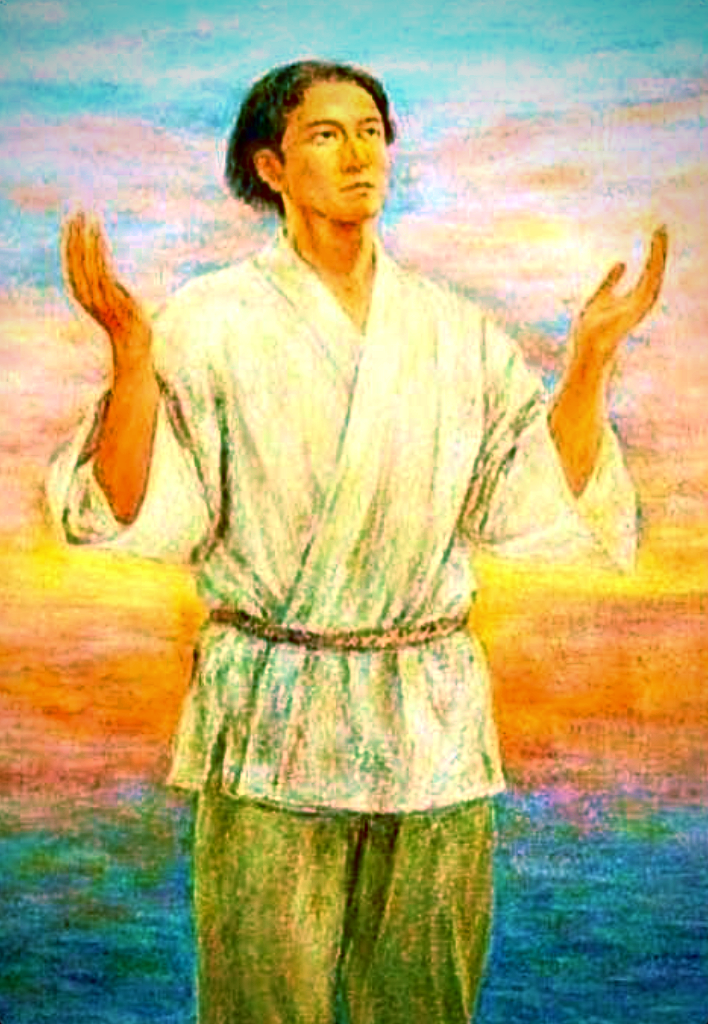Thomas Ochia Kintsuba Jihyoe of Augustine
Martyr
Augustinian Thomas “Kintsuba” Jihyoe of Saint Augustine, along with his 187 companions, was beatified November 24, 2008. The beatification ceremony took place in Nagasaki, Japan. “For all of us, this is a magnificent opportunity to renew our own faith, and to open our hearts to the inspiration of such a courageous and generous witness to Jesus Christ and the Gospel,”
Augustinian Prior General Robert F. Prevost, O.S.A. said. “In our world today, while most of us are not subject to physical dangers in professing our faith, we do find many situations of indifference and even direct opposition to the message of Christ and to the teaching of the Church.
The strength and courage of Blessed Thomas of Saint Augustine can encourage each of us to renew our own commitment in giving our lives in service to the Gospel.”
Thomas Jihyoe of Saint Augustine (1600?-1637) was a Japanese Augustinian friar who gave his life for Christ during the persecution of Christians in Seventeenth Century Japan.
Thomas was born around the year 1600 in Omura, Japan, near Nagasaki. His parents, Christian catechists, were both martyred for the Faith. As a youth Thomas studied under the Jesuits in Arima. When the Jesuit school was closed during the persecution, Thomas, along with his Jesuit teachers, was expelled from his native land. He went to Macao, where he continued his studies.
In 1622 he went to Manila, Philippines. There he entered the Augustinians, taking his vows in 1624. He was then sent to Cebu City, Philippines, where he completed his theological studies and was ordained a priest in 1627 or 1628. He was the first Japanese Augustinian friar to be ordained a priest. As the persecution in Japan continued, more and more Catholic missionaries were martyred. Thomas, seeing that the Christians there were in great need of pastoral care and guidance, felt a call to return to the land of his birth.
He tried several times to obtain the permission of his superiors to return to Japan, and finally, in 1631, he went back to his homeland. Since he was Japanese, it was fairly easy for him to conceal his priesthood from the authorities. He obtained a position in the administration of the Governor of Nagasaki under the name Kintsuba (Garnished with Gold). Fearless, and motivated by faith, Thomas was able to offer support to the imprisoned, including Augustinian Bartholomew Gutiérrez. When Bartholomew was killed, Thomas continued to encourage and help the other Christian prisoners.
Soon the Governor began to suspect that there was a priest ministering to the captives in jail. Thomas had to flee the city. He took refuge in a nearby cave. He became the object of a famous manhunt. Officials posted in many places his picture with the warning, “Do not harbor this person! If you know where he is, turn him in.” So many of these “wanted” posters were displayed that his face became well-known throughout Japan.
Hiding was difficult. Thomas would go out under cover of night to minister to the faithful Catholics. He constantly changed his appearance, wearing disguises and never following the same route twice. Finally, in 1637 he was captured. He revealed his true identity to his captors. He underwent many kinds of cruel torture. Remaining steadfast in his Christian faith, Thomas was condemned to death.
On November 6, 1637 he was hung by his feet with his head inserted into a pit of rotting garbage until he died. He was initially listed along with the three Jesuits and 184 lay Catholics whose process of beatification and canonization was opened in 1996 by the Bishops of Japan. Subsequently, Thomas' cause was entrusted to the Augustinians.
Blessed Thomas “Kintsuba” Jihyoe of Saint Augustine and his 187 companion martyrs were beatified November 24, 2008. Josef Sciberras, O.S.A., the Augustinian Postulator of Causes, oversees the progress of his cause.
The death of these Augustinians, religious and laity, men and women, natives of Japan and missionaries from foreign lands, bears witness to the universality and unity of the Order and of the Church. The grace of Christ and the bonds of fraternity inspired and sustained the faith and fidelity of our brothers and sisters under horrendous circumstances.


